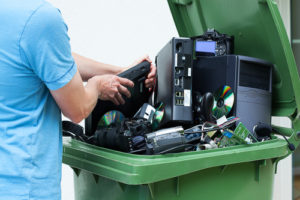
In 2009, the Environmental Protection Agency estimated that the United States produced 2.37 million tons of eWaste – obsolete electronics and accessories like old computers, dead phones, and empty inker cartridges.
Only a quarter of those materials were recycled, meaning more than 1.7 million pounds of eWaste that could have been reused or broken down into parts was just disposed of or incinerated.
College campuses, with their abundance of printers, computers, and tech savvy students, can be one of the main sources of this waste. Now FundingFactory, a recycling program for schools and nonprofits, has created a new initiative targeting universities’ eWaste recycling habits.
“Colleges are like small cities,” said Conor MacDowell, a channel development manager at FundingFactory. “When you have that much printing going around campus, a lot of that waste can be recycled.”
The program, which is called COLLECTED, officially launched on August 15, though FundingFactory has already been behind university recycling initiatives on several campuses. More than 400 colleges have signed up for COLLECTED, and 320 schools are already actively recycling with the program.
See Page 2 for how much eWaste one university recycled over the last decade.
COLLECTED works by paying universities for their recyclable eWaste, which can include computers, tablets, GPS devices, MP3 players, cell phones, and inker cartridges. The money can then be used for scholarships and charitable donations.
The cash can really add up. Over the last decade, the University of Northern Illinois recycled 32,000 cartridges, MacDowell said. That’s 75,000 pounds of recycled eWaste which would be worth $25,600 even at FundingFactory’s mid-level prices.
Empty ink jet cartridges can fetch a school anywhere between 20 cents and $2.60. Larger items, like a couple-generations-old iPad, could be worth more than $200.
With online accounts through FundingFactory’s website, participants can stay on top of their recycle rates and earnings.
MacDowell said that convincing colleges to start recycling their eWaste is not difficult, and that programs like COLLECTED just provide an extra push. Many universities have been attempting to become more sustainable in recent years and recycling has become increasingly popular with students.
“It’s important to have that sustainable culture,” MacDowell said. “They see what’s being thrown out and a lot of it is a large amount of waste. Recycling is important to many students, as well as becoming a more sustainable campus in general and maintaining that for generations to come.
- What does higher-ed look like in 2023? - January 5, 2015
- Are ed-tech startups a bubble that’s ready to burst? - January 1, 2015
- Are MOOCs really dead? - August 28, 2014

